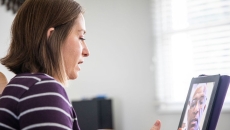Telehealth
HIMSS23
According to Howard Rubin, CIO of Evara Health, an FQHC, telehealth has helped an underserved population overcome the challenges of finding care.
Medicare beneficiaries who received telehealth services for opioid use disorder during the pandemic had a 33% lower risk of fatal overdose.
Panelists at ViVE 2023 discussed the future of preventive medicine as retail chains and virtual care players push into the space and more patients avoid primary care altogether.
HIMSS23
Randy Bush, principal at Deloitte Consulting, and Joe Drygas, VP of healthcare for AT&T Business, preview their HIMSS23 presentation explaining 5G's increasing centrality for healthcare and connectivity.
The program will be available through Amwell in the second half of 2023.
Maven said the acquisition of Naytal will accelerate its growth in the U.K. and Europe.
Tyto Insights for Wheeze Detection analyzes lung sounds for possible wheezing in adults and children 2 and older.
Barbara Rothbaum, executive director of the Emory Healthcare Veterans Program and Trauma and Anxiety Recovery Program, discusses Emory's no-cost two-week mental health treatment program that pays for flights, hotels and therapy for vets.
Viz.ai also announced an agreement with Bristol Myers Squibb to identify patients with hypertrophic cardiomyopathy.
WeightWatchers signed an agreement to acquire telehealth platform Weekend Health, also known as Sequence, for $106 million.









